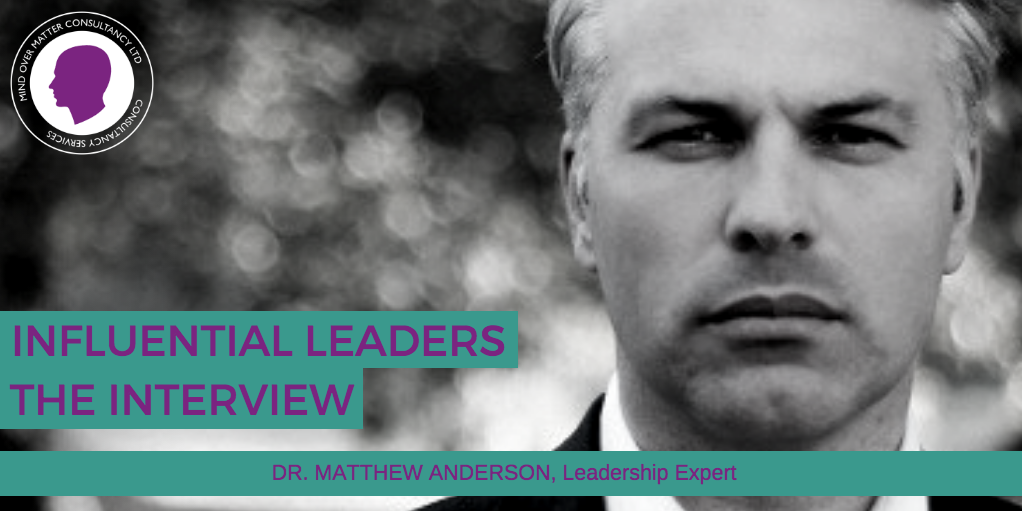Dr Matthew Anderson
This leadership expert is inspired by those that have flashes of the extraordinary. Most often, the dead, who mirror experiences of his world.

Entrepreneurial and dynamic, Matthew performs best when helping leaders deal with tough strategic issues and unchartered territory, through transformative thinking and approaches to help build tomorrow’s organizations, today.
He works globally across six sectors supporting leadership teams, organisational development projects and transformational change programmes.
Matthew, Welcome to the Leadership interview
How do you start your day?
Always family first. I tend not to think of myself at all until I’ve engaged with them. Right brain first.
Then I get my head down and stuck into my own actions. Trigger left brain.
I’ve found the busier I get nowadays with mounting commitments and my work, the less time I have to divert to non-essential things. I’ve become much more action-orientated.
Despite being relatively aware of wellbeing and work-life balance, and the significant benefits of more time out for myself, in reality, the practicality of ‘more time for me’ means less time for others. But I made that choice a long time ago to put others ahead of myself.
It may even be genetic, when I look at my parents and how they lived their lives.
What was your first job and what is the worst job you’ve ever done?
My first job I invented for myself. I was a peculiar teenager I think, with an extremely off-piste taste in progressive rock. So, I decided to write a letter to my favourite band of the day, pretending to be a much older gig promoter, and invite them to perform a concert in my local school hall. I would organise it all.
Upon arrival, they weren’t fooled by my acned teenage face, frankly. Nevertheless, that was exactly what I did, brought them north to Mordor, and it was a flop.
About 30 people attended the gig. However, I still enjoyed the rather expensive, and intimate, performance from my favourite band. And I acquired a bit of debt as a generous reward. Great start. I still have the gig poster I made in a drawer; a memento of when work was innocently 100% passion driven with no consideration at all of what it would cost.
Worst job? The first job I had upon leaving the army, I was parachuted into a struggling local authority as a change and leadership consultant and encountered a rabble of cynics with no interest whatsoever in undoing their dire circumstances.
I walked into the nemesis of organisation, unity, and motivation. It was a culture shock. I didn’t thrive; neither did they.
We parted, mission failure. Learning? Sometimes people can’t change, so don’t destroy your own ambition and faith because of them.
What advice would you give to others about furthering their careers?
Don’t look at the detail, look higher. Details like location, salary, company reputation are the sorts of things we are all encouraged to focus on; but for me, they have always turned out to be a distraction from finding my place in a busy world and where I add value.
Rather, have a vision of yourself and the purpose – the things you stand up for – behind what it is you want to achieve. This is not egocentric necessarily, it might rather be about the cause, the environment and the kind of people you want to exist alongside.
For me I value positive transformational change, learning new things, being around hugely talented people and doing the right thing, in a moral sense. So, I surround myself with opportunities that match that criteria.
I believe what you do defines who you are and what you give back; so, placing yourself in the wrong circumstances can result in you living a life that doesn’t fulfill you, reflect your values, views of the world, or teach you anything meaningful and new.
Also, don’t chase the numbers, chase the value creation. If the value of what you do is rich in outcomes – better people, better performances, better working environments – people will recognise your worth and reward you, as they’ll want you to be around them.
Who inspires you and why?
Dead people inspire me, sadly.
I tend to look backward for people that mirror my experience of the world. It’s a bit like that Woody Allen movie “Midnight in Paris” where the lead character spends successive evenings with great talents of the past. That would be my dream.
I’d want to spend my evenings with great people like Turner, Pascal, Lewis, Montrose, and Moses. They inspire me because they reveal flashes of the extraordinary in life; the genius of seeing things differently.
I’m sure we all aspire to that, in fact. I also, like so many others, recognise my father as hugely inspirational. This is a distinctly consistent correlative in leadership narratives.
Do you think a talent to lead is nature or nurture?
Hugely complex question. No definitive answer. Good arguments for both.
There are sound scientific arguments for generic inheritance in leadership abilities; equally, I’m a convert of existential phenomenology and buy into the nurture perspectives. For example, both have sound genetic and epigenetic arguments in their respective cases.
So, I’d say ‘depends on the case’. Call it my Leadership Uncertainty Principle; both exist and don’t exist simultaneously.
How can a leader fail? Do you have a personal example?
Depends what we mean by fail.
I once got into a rather heating debate with a leading academic scholar on whether he was right in using ‘derailment’ as criteria for leadership success.
I disputed this, arguing that some of the best leaders in history could easily have been perceived as failures in their time; due to death, imprisonment, scandal or election defeat.
And, conversely, I’ve witnessed some the poorest leadership sitting in boardrooms of some of the world’s most powerful and recognised brands. It also depends on the definition of leadership!
So, sorry, not the best answer in the world. But I believe, ironically, that a leader can fail when they pursue their own ambitions in such a self-centered fashion that they disregard the interests of their own team members in order that they accomplish their own ambitions.
Does this really exist you might ask? In every boardroom with bonuses, you have this existential tension. Sometimes leaders manage this tension well, sometimes they fail. But almost at all times, in private discussions, they know which one it is.
What are your greatest strengths and weaknesses?
Strength, self-awareness: I know what I am and what I am not.
Weakness, I can be rather non-compliant – to the frustration of others – when asked to engage with something I don’t believe in. Perhaps it’s my Presbyterian roots. Stubborn.
What do you find most challenging about being a leader?
When people can’t yet see that change is good for them, and they are stuck in a redundant worldview, which they maintain rose-tinted views of. They don’t recognise they are becoming victims of self-abuse.
Ironically, these same people come across conceited and proud, and very difficult to engage with in empathic discussions. They can be extremely disruptive to a point where they either have a Damascus Road moment or spiral out of control and hinder change and progress of those around them.
Most organisations face this challenge in key functional areas, tragically those begging for second-order change.
What are you most proud of?
My daughters.
What’s your biggest self- indulgence?
Coffee and eBay. Both horrible vices.
You can follow Matthew on LinkedIn
If it is of interest, Mind Over Matter Consultancy delivers a range of interactive, highly-pressurized programmes for high performers in companies across the world, underpinned by applied leadership and management theory. These are lead by experts in their fields.
We are able to support the following areas:
- Communication
- Leadership
- Negotiation
- Talent Identification
- Decision Making
- Motivation
- Problem Solving
- Teamwork
Try our bespoke #BlowYouAwayDays programmes where you and your team will be pushed to the limit in anything from RNLI training or kidnap scenarios to dance development, a rollercoaster crash, a grand prix circuit or the SAS.
